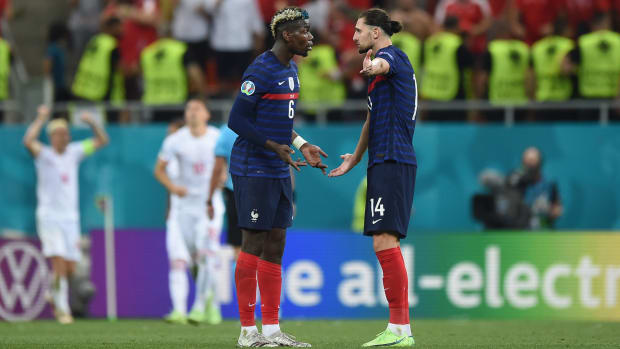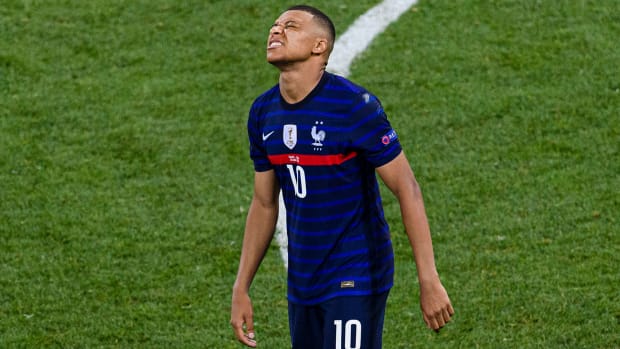New on Sports Illustrated: Where it All Went Wrong for France at the Euros
The reigning World Cup champion has enviable talent, squad depth and a blueprint for success. So how did its Euros wind up with a last-16 exit to Switzerland?
It didn't take much to see that Group F at Euro 2020 was unequivocally the competition's Group of Death. Yet none of the sides in it have reached the quarterfinals of the tournament, which might be taken as evidence that in football, as William Goldman said of show business, nobody knows anything.
Except we did know Hungary was game for a challenge despite its limitations. And we did wonder about the integration of this Portugal side, even if nobody expected the complete capitulation against Germany. And we’d seen Germany fall apart at the last World Cup and in some significant, subsequent losses; that Joachim Löw should not have been allowed to continue as coach after Russia 2018 had been increasingly apparent with each passing week. Both the 2016 European champion and the 2014 world champion had the potential to be less than the sum of their parts.
But France's failure was the real shock. This is an extravagantly gifted squad. It probably should have won the last Euros, losing in extra time in the final on home soil. It did rebound to win the World Cup. It has such strength in depth that there was no place in the squad for Man City defender Aymeric Laporte (who decided to declare for Spain instead) or new Bayern Munich center back Dayot Upamecano. Under manager Didier Deschamps it had developed an understated style of play that seemed obsessed with doing just enough to win. This, it seemed, was the formula for international football: a solid block plus an array of stars who could produce a moment of magic when it was needed.
The outcome was the oddest of things: a team that was frequently boring to watch (for neutrals, anyway) but that every now and again became involved in a high-scoring classic. But by and large it won. At least until Monday.
So what went wrong against Switzerland? How could this strongest of favorites go out to a team of journeymen, to a nation that hadn’t reached the quarterfinal of any major tournament since the 1954 World Cup that it hosted—to a nation that had never beaten France before outside of friendlies? And how, specifically, could it squander a two-goal lead with nine minutes to go?

The best answer, perhaps, was to be found in the stands, where Adrien Rabiot’s mother became involved in a heated row with the families of Paul Pogba and Kylian Mbappé. She reportedly raged about the way Pogba had given the ball away in the buildup to the Swiss equalizer and told Mbappé’s father that he should teach his son to be less arrogant.
This is not a happy camp—this is not a new phenomenon for France—and Paris Saint-Germain seems to lie at the heart of it. Rabiot, whose mother is also his agent, clearly still feels aggrieved by the manner of his departure from PSG for Juventus in 2019. Mbappé remains a brilliant footballer and is still only 22, but it feels as though his progress has stalled a little recently as the astronomical expectations for him soar. Playing for a club that, even if it somehow failed to win the league this season, is way richer and way stronger than any of its rivals, perhaps does not encourage a player to stretch himself.
Mbappé’s future remains unclear, with his contract set to expire next summer, and that may be playing on his mind, but he has shown only flickers of his extraordinary talent since the return from the COVID-19 hiatus, and he went scoreless in this competition. He perhaps wasn’t helped at this tournament by being asked to play from the left rather than the right—an indication, perhaps, of the struggle France had covering for the phasing out of Blaise Matuidi. Nobody should be scapegoated for missing a penalty, but Mbappé was notably more rushed in taking his than the four French players who had gone before him. Perhaps he felt the pressure.

Deschamps’s decision to recall Karim Benzema may still draw criticism given the history there, but he did score four goals—including the two vs. Switzerland that appeared to turn the tide in France's favor—and the suggestion is that he was a response to a pre-existing problem in the forward line rather than the cause of the problem.
Then there’s Pogba. Unconvincing in the first half vs. the Swiss, he was much improved as the shape changed to add an additional midfielder in the second, and he scored a sensational goal and played four exquisite forward passes. But then he also gave the ball away sloppily, giving Switzerland the possession from which it scored its goal to force extra time. Not only was that a basic error, especially for a deep-lying midfielder, but it cast his absurdly extended goal celebration in a poor light. Had he thought the game was done? Had he allowed his concentration to slip? Perhaps nothing is ever quite so simple, but when you celebrate like that and then make a mistake like that, it doesn't come off well.
Worse, the incident seemed to encapsulate a wider issue within the French squad of hubris. It was as though it had come to believe it would always manage to do just enough to get by, as though Deschamps’s functionality had mutated into complacency.

Questions must be asked of Deschamps, too, not only about the atmosphere in the squad, but about the ill-conceived switch to a back three for the last 16. It is true France was a bit hobbled, with Lucas Digne and Ousmane Dembélé both out injured and a hurt Lucas Hernandez unused on Monday, but then if any team was built to overcome some absences, it was this France. It's also true that France was a couple of inches away from skating by again on a brilliant moment, with Kingsley Coman's volley at the death of regular time, after Pogba picked him out, clanging off the crossbar.
Nevertheless, Deschamps had the best squad in the tournament, and he blew it. Being solid and having good players was enough at the World Cup, but it turns out management is about more than that. And whoever is the French's manager—whether Deschamps remains in the role, or whether the French federation makes a move for Zinedine Zidane or someone else—will always have to deal with the PSG issue.
More Euro 2020 Coverage:

Comments
Post a Comment